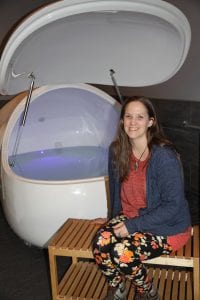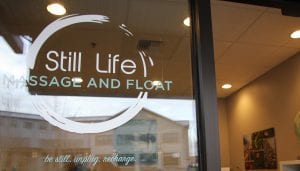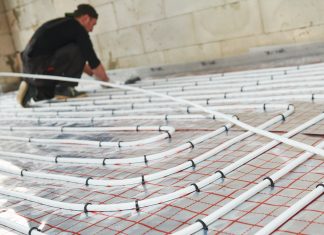A lot of the time my kids don’t seem to notice if I’m having a particularly bad day. I can be making dinner while holding my wailing baby as my three year-old daughter clings to my legs literally begging for attention. Then my four year-old daughter will march up and demand that I find her some drawing paper. Like, NOW.

Like all young children, my kids lack theory of mind. They cannot level with me. They cannot imagine that I might have anything going on besides fulfilling their every whim. And that’s ok. Because they are children.
But here’s the thing – we live in this world with innumerable people swirling around us. Grown-up people with stories of their own. People fighting things. People with problems. We all struggle at some point, and I strive to set an empathetic example for my girls. Along with that, I want to ensure that they have the tools to recognize their own struggles and help themselves.
There are many varied ways to confront your inner turmoil. I’m a talker. I need to sit down with my husband or call my mom or my sister and talk until it’s all out. An astute friend once asserted that I should see a therapist. Not because anything was “wrong” with me. Just because he recognized that I love feedback. It’s true. Talking about oneself is the penultimate “me” time. But talking one-on-one with a trained professional is just one way to gain perspective and focus.
I recently met a stunningly self-aware woman who has used numerous forms of treatment for over a decade to reach this point. Leslie Wargo moved to Bellingham 13 years ago from her Wyoming hometown. Just after arriving in Western Washington, she began experiencing terrifying, unrecognizable symptoms and started to relive a devastating, 20-year-old incident from her adolescence. Leslie had never shared with anyone that she was a survivor of an appalling sex-crime, therefore she was never able to receive any support to deal with the resulting trauma. Instead, she lived in a highly-critical, verbally abusive household, holding on to the pain with no one to turn to for support.

When later, as an adult, Leslie relocated and distanced herself from the attack, she developed post-traumatic stress disorder (PTSD). Removed from her small town and a critical environment, she found herself in a safe place where she could finally process what had happened those many years ago. The memories rushed back into her daily life and she began living in a state of hyper-vigilance. This high-adrenaline, high-stress existence prompted her to seek out treatment. Over the past 13 years she has used cognitive behavior therapy, art therapy and writing therapy to name just a few. These have all helped purge, as she puts it, “the garbage of [her] mind.” But nothing could temper the physical symptoms of PTSD. Until she discovered floating.
Leslie first started to float out of curiosity after one of her clients mentioned Bellingham’s Still Life Massage and Float. The detox effects and relaxation of the skin-temperature, 1,200 pound, Epsom salt bath quickly led her to become a regular. Still Life has become something of a second home. With this regular floating, Leslie began to see major results and so did her friends. Not only did her body recuperate more quickly from the pain of her physical work, but people began commenting on her personality changes. She didn’t seem so uptight anymore. She was less negative. She had lightened up. Leslie hadn’t even realized it for herself yet, but it was certainly true. The floating calms her down so she can implement the techniques she has learned in cognitive behavior therapy. “I can hear the more positive amongst the chatter of the garbage that I have spent decades believing and feeling,” she explains.

Leslie has been floating for about 18 months now and it has been a full year since she has experienced a PTSD episode. Gone is the horrific reliving of the past. Gone are the regular nightmares and the constant state of hyper-vigilance. Floating has replaced her overactive, high-adrenaline mind with peace. Her body can relax.
“It is my safe place,” Leslie says of the floatation pod. “I have always feared my mind, fearing, ‘When am I going to have an episode and how long is it going to last? Am I going to have two weeks, a month of depression afterwards because I feel horrible again?’ I feared my mind, my body. I feared everything about me.” After a PTSD episode, Leslie could find herself on the couch for hours of painful processing, retreating from daily life. But now, a 90-minute session of relaxation, physical therapy and quiet helps bring a calm into the rest of her day. Rather than sitting and dwelling, Leslie can better focus and accomplish what she wants, when she wants. Floating is a therapy that fast-tracks her thought process, which is an invaluable benefit.
Leslie would like to raise awareness about float therapy in regard to PTSD, anxiety, OCD and other mental health issues. And she is not alone. Justin Feinstein, PhD., a clinical neuropsychologist at the Laureate Institute for Brain Research (LIBR) in Tulsa, OK is pioneering research that, according to their website, aims to answer the question, “Can an intervention that enhances present moment awareness for internal bodily sensations help patients with anxiety establish a healthier balance between their body and brain?” One of Dr. Feinstein’s approaches involves floatation environments, which he asserts are, “highly effective at removing the distractions from the external world so that patients can more clearly experience their internal world.”

Leslie pointed out to me that chiropractic treatment and medical massage are accepted forms of physical therapy, widely regarded as good for the body and mind, thus many patients can bill their insurance for them. Float therapy does not fall into this category – yet. The future direction of the research at LIBR is to develop floatation as an intervention approach for different mental illnesses. This is Leslie’s goal too.
To raise awareness and funds for the ongoing research at LIBR, Leslie has challenged herself to a float marathon. She will float at least 60 minutes every day for the entire month of January. That’s 31 days of floats—an unprecedented amount of time spent in a float pod. Still Life Massage and Float is sponsoring her ‘Float-a-thon’ by giving her full access to their float pods. She has set a goal of raising $2500.00, but the sky’s the limit.
We all need tools to help us recognize the connection between our bodies and brains. Whether acute or chronic, major or minor, we all face challenges to our physical and mental health. I often feel like a mom on the verge of a major meltdown. Talking is my therapy. Leslie works daily to maintain a sense of peace. Floating is her therapy. My girls will grow up to confront their own issues and I am grateful that there are people like Leslie acknowledging the many necessary forms of therapy and working to make each one just as available as the next.
Click here to learn more about Leslie’s story and to donate to her float challenge.
Sponsored










































